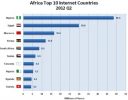As e-commerce continues to gain popularity across the African continent, more effort needs to be paid towards facilitating flawless delivery to customers. This is further supported by the Global e-Commerce Logistics 2015 report which reveals that e-commerce logistics is rapidly changing to keep pace with this quickly evolving market.
This is according to Sumesh Rahavendra, Head of Sales for DHL Express Sub Saharan Africa, who says that the delivery of goods purchased online is one of the most important elements to a customer’s e-tailing experience, and yet is often overlooked by retailers.
A recent report by McKinsey & Company(2) revealed that e-commerce could account for 10% of retail sales in the African continent’s largest economies by 2025.The birth of e-commerce is revolutionizing local logistics practices and physical distribution networks.
“Consumers are now able to access and purchase a range of products at a click of button, and are increasingly expecting immediate delivery, which makes logistics increasingly important. This in turn is driving retailers and logistics providers to seek new initiatives to provide better delivery offerings and competitive advantages, such as same-day delivery and flexible returns.”
DHL’s own Global E-Tailing 2025 study(3) analyzed the role which e-commerce will play in consumers’ lives in the year 2025 and how it will influence consumerism, retail and logistics. The study found that as online retail continues to gain popularity in both developed and emerging markets, logistics companies are set to play a key role in providing vital supply chain management solutions that are able to evolve with consumers’ changing shopping habits.
“With e-commerce quickly gaining traction in the continent, many companies are still determining what this boom will mean for their distribution network infrastructures. When e-commerce first entered the market, it was more about the convenience of ordering a product from home, and then waiting for the package to be delivered to your doorstop. Delivery times were a couple of days or even weeks. Today, the growing middle class across the continent want a greater variety of products and services within shorter delivery periods. Delivery time frames are now measured within minutes and hours and need to take place at a convenient time and location, dictated by the consumer.”
“E-commerce is also a saving grace for consumers in outlying areas, who would traditionally have had difficulty accessing brick and mortar stores. International and domestic e-tailers now offer door-to-door delivery of a wide variety of high quality products.”
“E-tailers should therefore select a reliable and reputable logistics provider, as they are ultimately an extension of their own business, and an important touch point that end consumers have direct contact with towards the end of the transaction stage. Competition in the e-commerce industry is fierce so it is the importance to delight customers with every transaction to encourage repeat business,” concludes Rahavendra.

